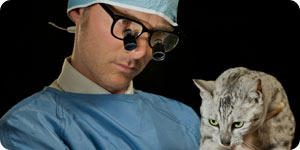
In order to treat Feline Fatty Liver Disease, or Feline Hepatic Lipidosis, understanding what this disease is and what causes it can be important. Feline Fatty Liver Disease is generally a disease of the cat’s liver in which there is an accumulation of lipids or fats in the cat’s liver, causing damage to the liver. Feline Fatty Liver Disease is idiopathic, meaning that there is no actual known cause, but there are several theories as to what causes it. One such theory or belief is that the cat’s body deposits fat cells into the liver when an obese cat loses its appetite and quits eating, usually taking a couple of weeks. Loss of appetite in cats can come from many other diseases such as diabetes mellitus, inflammatory bowel disease or renal disease, making Feline Fatty Liver Disease a secondary disease. The deposited fat then gets stored in the liver cells instead of being sent throughout the body and damages the liver.
- What are the symptoms of Feline Fatty Liver Disease? Symptoms of this feline disease are loss of appetite, weight loss, excessive salivating, vomiting, being lethargic, jaundice and even depression.
- How is Feline Fatty Liver Disease Diagnosed? This feline disease is diagnosed by a licensed veterinarian, using history of the ill feline or cat, a physical exam of the cat, blood work, x-rays and even a surgical biopsy. The veterinarian may also choose to use a fine-needle aspirate of the liver and/or a histopathology.
- What is the treatment for Feline Fatty Liver Disease? Treatment of this feline liver disease, also prescribed and administered by a licensed veterinarian, includes dietary or nutritional therapy, generally with a feeding tube, as the feline will still be suffering from loss of appetite. A high protein diet with the appropriate vitamins, nutrients and calories is generally fed to the cat. The cat may also be suffering from dehydration which will also have to be treated.
- What is the prognosis for Feline Fatty Liver Disease? Prognosis of this feline disease can be very positive if the ill cat has been taken to the veterinarian and responds to the treatment that the veterinarian administers. But, until the cat’s appetite picks up and it eats on its own, it is still in the woods.
Although the prognosis for Feline Fatty Liver Disease, also known as Feline Hepatic Lipidosis, is very encouraging, prevention of this disease, like many others, is always best. Prevention includes watching your cat’s weight and not allowing it to become over weight or obese, as this is usually the onset to Feline Fatty Liver Disease.
